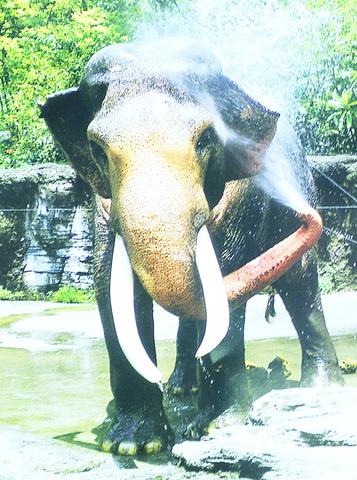Lin Wang (林旺), Taipei City Zoo's star elephant, decorated World War II veteran and the world's oldest Asian elephant in captivity, died early yesterday morning at the zoo at the grand old age of 86.
"Lin Wang was found dead by his pool at 2:30am yesterday. He died with dignity from extreme weakness due to old age," said Lin Hua-ching (林華慶), a city zoo section chief.
An autopsy later determined that he died from cardiopulmonary failure.

PHOTO: REUTERS
Lin Wang showed signs of frailty after the Lunar New Year holiday early this month, moving slowly and eating less.
The zookeeper said the elephant had been observed spending unusually long periods of time in the pool by his enclosure, known as the White House, since last Friday.
"Though we knew his health was deteriorating, we're still surprised that he has died so soon. But we take solace from the dignified way in which he died -- the fact that he didn't experience a lot of pain," Lin said.
The zoo plans to have the body of the pachyderm stuffed and displayed at the zoo, together with a reconstruction of his skeleton, an undertaking that will require around NT$5 million.
"We hope local businesses will donate the necessary funds for the project," Lin said.
The octogenarian had lived in Taiwan for more than five decades. Known as "Granddaddy Lin Wang," the elephant was an icon to many Taiwanese, young and old.
President Chen Shui-bian (陳水扁) yesterday sent wreathes to the zoo yesterday, bearing the inscription, "For Lin Wang, a friend forever."
Taipei City Mayor Ma Ying-jeou (馬英九) said: "The average life expectancy of Asian elephants is 50 years. Lin Wang had exceeded that period by so long that he had become an icon to four generations of people in Taiwan. When I was a child, my parents took me to see Lin Wang at the zoo. When I became a father, I took my daughters to see him. We watched him grow old, but he also accompanied us as we grew up."
Ma said the city government had originally planned to allow the nation's students and children to visit the zoo for free to wish the elephant well for three days starting Friday, knowing that he was weakening.
The activity will still proceed as planned, but for the purposes of conveying condolences.
"We didn't expect him to die so soon. But the activity will go ahead as scheduled," Ma said.
Lin Wang's extraordinary story began in 1943 when the ROC military acquired the elephant from Japanese prisoners of war in Burma during World War II. At the time, Lin Wang was about 26 years old.
He was used for carrying military supplies during the war and was honored later for his contributions to the war effort.
In 1947, he was transported to Kaohsiung and was transferred to Taipei City Zoo in 1954, where he lived with his long-term companion Malan.
Malan died last October at the age of 54 due to a malignant tumor on her foot.

The combined effect of the monsoon, the outer rim of Typhoon Fengshen and a low-pressure system is expected to bring significant rainfall this week to various parts of the nation, the Central Weather Administration (CWA) said. The heaviest rain is expected to occur today and tomorrow, with torrential rain expected in Keelung’s north coast, Yilan and the mountainous regions of Taipei and New Taipei City, the CWA said. Rivers could rise rapidly, and residents should stay away from riverbanks and avoid going to the mountains or engaging in water activities, it said. Scattered showers are expected today in central and

COOPERATION: Taiwan is aligning closely with US strategic objectives on various matters, including China’s rare earths restrictions, the Ministry of Foreign Affairs said Taiwan could deal with China’s tightened export controls on rare earth metals by turning to “urban mining,” a researcher said yesterday. Rare earth metals, which are used in semiconductors and other electronic components, could be recovered from industrial or electronic waste to reduce reliance on imports, National Cheng Kung University Department of Resources Engineering professor Lee Cheng-han (李政翰) said. Despite their name, rare earth elements are not actually rare — their abundance in the Earth’s crust is relatively high, but they are dispersed, making extraction and refining energy-intensive and environmentally damaging, he said, adding that many countries have opted to

CONCESSION: A Shin Kong official said that the firm was ‘willing to contribute’ to the nation, as the move would enable Nvidia Crop to build its headquarters in Taiwan Shin Kong Life Insurance Co (新光人壽) yesterday said it would relinquish land-use rights, or known as surface rights, for two plots in Taipei’s Beitou District (北投), paving the way for Nvidia Corp to expand its office footprint in Taiwan. The insurer said it made the decision “in the interest of the nation’s greater good” and would not seek compensation from taxpayers for potential future losses, calling the move a gesture to resolve a months-long impasse among the insurer, the Taipei City Government and the US chip giant. “The decision was made on the condition that the Taipei City Government reimburses the related

African swine fever was confirmed at a pig farm in Taichung, the Ministry of Agriculture said today, prompting a five-day nationwide ban on transporting and slaughtering pigs, and marking the loss of Taiwan’s status as the only Asian nation free of all three major swine diseases. The ministry held a news conference today confirming that the virus was detected at a farm in Wuci District (梧棲) yesterday evening. Authorities preemptively culled 195 pigs at the farm at about 3am and disinfected the entire site to prevent the disease from spreading, the ministry said. Authorities also set up a 3km-radius control zone